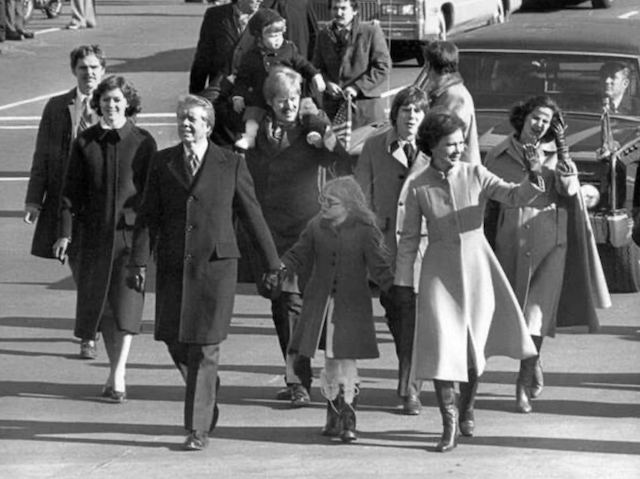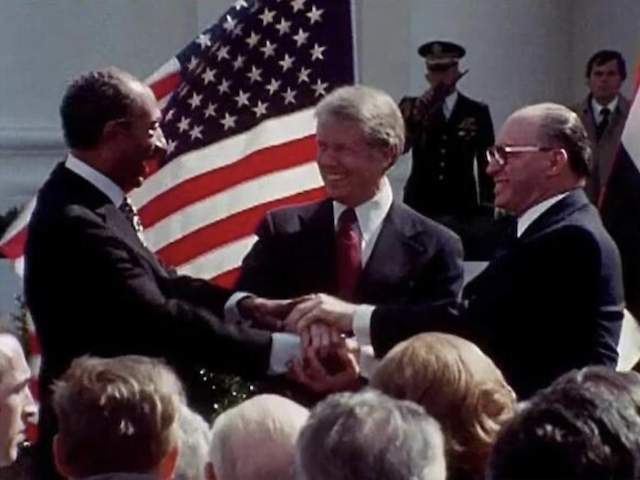In his announcement speech for his presidential run , in 1974, Georgia Governor Jimmy Carter said there were things he would not do to become President: “I would not tell a lie. I would not mislead the American people … and I would not betray your trust.”
If anything defined President Carter, it was his basic decency and morality.
Elected in 1976 in the aftermath of Watergate and Gerald Ford’s controversial pardon of Richard Nixon, Carter believed he had a responsibility to restore Americans’ faith in the integrity of their government.
“We want to be proud again,” he told the crowd at the Democratic National Convention. “We just want the truth again.”
It was a stunning rise to power for a little-known Georgia governor. “Jimmy who?” was the question a lot of Americans asked when Carter first announced that he was going to run for the White House.
Stuart Eizenstat, who started working with Carter when he ran for governor in 1970, and ultimately became his White House Chief of Domestic Policy, said the reason Carter thought he could win was that “he had a great sense of his own capabilities.”
Though the son of a successful peanut farmer, Carter grew up without electricity or running water just outside Plains, Georgia. He won admission to the Naval Academy, and while at Annapolis, Carter started dating Rosalynn Smith. They married in 1946 and she would become his most trusted advisor. Eizenstat said, “They were not only married for over 70 years; they had a love affair.”
Carter had to abandon his Naval career to take over the family peanut business when his father died. The Carters moved back to Plains and started raising three sons and a daughter.
Chip Carter, the second-born son, recalled that, against all odds, his father captured the Democratic nomination and, with Minnesota Senator Walter Mondale as his running mate, won the election.
Chip said he helped arrange one of the most famous images of the Carter inaugural: “I went to dad’s Secret Service agents and said, ‘We might want to do this walk.'”
That walk down Pennsylvania Avenue seemed to symbolize the open and energetic approach Carter would bring to the White House.

On Inauguration Day following his taking of the Oath of Office, President Jimmy Carter walks with First Lady Rosalynn Carter, and the couple’s daughter, Amy, down Pennsylvania Avenue, in Washington, D.C., January 20, 1977. Consolidated News Pictures/Getty Images
But it was to be a tumultuous presidency, in part because of Carter’s complex personality. Journalist and author Jonathan Alter said, “He was humble, affable, open, and then also he could be difficult, prickly, stubborn.”
Alter, who spent many hours with Carter for a biography, noted, “There was much more accomplishment in the Carter presidency than I had thought.”
Famous for wearing sweaters to dramatize how he’d turned down the White House thermostats, Carter pushed through comprehensive energy legislation. He created the Department of Education; deregulated airlines; doubled the amount of land in our national parks; and in one of his most important and controversial initiatives, Carter negotiated the return of the Panama Canal Zone to the Panamanians. “This opens a new chapter in our relations with all nations of this hemisphere,” he said.

President Carter with Egyptian President Anwar Sadat and Israeli Prime Minister Menahem Begin, at the signing of an Egyptian-Israeli peace treaty, at the White House, March 26, 1979. CBS News
But perhaps his crowning foreign policy accomplishment was pushing through the Camp David Accords, the historic 1978 agreement between Israel and Egypt. Alter called it “the most successful peace treaty since World War II.”
But in 1979, other Middle East issues would lead to gasoline shortages that created high prices and long waits at gas stations. Carter’s popularity plummeted. And in July he decided to give a speech to the nation warning of a crisis in confidence: “Too many of us now tend to worship self-indulgence and consumption,” he said.
Much to the surprise of many politicos and pundits, the speech was immediately popular. According to Eizenstat, “The speech hit a raw nerve, contrary to my own belief. And then, he stepped on his own headlines. He asked for the resignation of his entire cabinet. It looked like the whole government was in chaos.”
And then, in November of 1979, 52 Americans were taken hostage at the U.S. Embassy in Iran , followed by a failed attempt to get them out – all in the lead-up to the 1980 presidential election.
As Alter characterized it, “The roof caved in on Jimmy Carter.”
And so, Carter would lose to the upbeat message of Ronald Reagan. But it was the start of a whole new chapter – an ex-presidency that, Carter himself said, was better than his presidency.
“That may be true,” he told “CBS Sunday Morning” in 2006. “Certainly my reputation has been better in the post-presidential years than maybe in the White House.”
And no wonder. He and Rosalynn (who died in 2023 ) founded the Carter Center to promote democracy and improve healthcare around the world. In 2002, Jimmy Carter won the Nobel Peace Prize . In his Nobel laureate speech, he said, “We will not learn how to live together in peace by killing each other’s children.”
Carter wrote more than 30 books over the years, and he and Rosalynn would continue their work building homes for Habitat for Humanity, all the while teaching Sunday School in Plains.
At times Jimmy Carter could seem like a Superman, coming back in 2015 from melanoma that had spread to his brain and liver. At 100, James Earl Carter Jr. lived longer than any other American President.
Asked how he thought his father should be remembered, Chip Carter replied, “A beautiful human being who gave everything he could to his children and his country, and who made it a better place than when he found it. And you know, that’s about as good as I can get.”
And as for President Jimmy Carter’s own reflections, in 2018 he told “Sunday Morning” anchor Jane Pauley, “I was a champion of peace and human rights. I’ve sought to carve out for myself a productive and, I hope, useful and certainly gratifying life. I have been very lucky.”
Written by Rita Braver for CBS News ~ January 5, 2025
